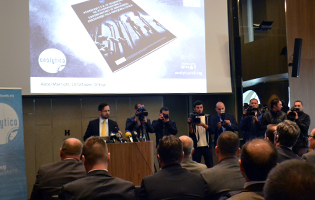
Conference: “Countering Violent Extremism in Macedonia”
Analytica Think Tank organized a conference on 19 October 2016 at Hotel Marriott in Skopje, where the year-long research titled “Assessment of Macedonia’s efforts in Countering Violent Extremism, view from civil society”, was presented.
The research, written by Analytica’s researchers Filip Stojkovski and KaltrinaSelimi looked at the institutional capacity and response to CVE. The conference brought together representatives of the civil society, state institutions and the international community to discuss the findings of the research, but also the current trends and challenges in CVE.
The conference was opened by Mr. Oliver Spasovski, Minister of Internal Affairs in Macedonia, and Andreja Bogdanovski, Research Fellow at Analytica. In his opening remarks, Mr. Spasovski pointed out the importance of institutional cooperation at the national and regional level for a more successful implementation of strategies on combating violent extremism in Macedonia.
The conference was consisted of three panels. In the first panel, research fellows Filip Stojkovski and Magdalena Lembovska presented the findings of the research and gave policy relevant recommendations. Mr. Stojkovski indicated that the phenomenon of foreign fighters is not new in Macedonia and that dozens of citizens have joined various paramilitary formations in the past few decades. He specified that the target group of extreme groups in Macedonia are the youngsters, with in average age of 20-25 years. In that context, he suggested that any future solution foreseen by the state institutions should specifically focus on the young people. In addition, Mr. Stojkovski highlighted that the strategy of Macedonian authorities in countering violent extremism is primarily focused on criminalization and repressive measures without working with local authorities to prevent the phenomenon of radicalization. He underlined that the prevention of violent extremism requires a comprehensive strategy which will strengthen the capacities of citizens and local groups, so they can show resistance to this type of negative behavior. Moreover, the issue of re-socialization and re-integration of former foreign fighters has also been raised.
Ms. Lembovska presented the findings from the focus groups conducted in three Macedonian cities, referring to the socioeconomic conditions for young people in those cities, the process of recruitment and their knowledge and attitudes about radicalization. In that context, Lembovska stated that religious communities in the country can play a positive role in countering this phenomenon. Hereby, the Islamic Religious Community can help to build the counter-arguments for young people to use in the future and protect themselves from potential recruiters that might approach them. In addition, the Orthodox Christian Religious Community can help to clarify misunderstandings about the Muslim community that exists among their believers or help counter the emergence of Islamophobia, which lately has been used by recruiters as the main reason in convincing young people that they are hated and discriminated against on religious grounds in Macedonia.
During the conference, it has been advocated to politicians and state leaders to be more careful when giving public statements and that they should notlink this phenomenon to any ethnicity or religion since it has been proven to be a global phenomenon and it effects everyone. In this sense, the role of media has also been discussed.
The second panel was consisted of relevant stakeholders on CVE in Macedonia. Hereby, Ms. BesaArifi – Associate Professor on Criminal Law at SEEU, covered her speech in three main points: the importance of access to information by public institutions, the issues in the legal framework of Macedonia regarding CVE and the role of education towards this issue. She mentioned that a community networking among state institutions and civil society is needed, by pointing out the good practices in EU states. Furthermore, Mr. Agron Vonjika – PR Manager of the Islamic Religious Community, pointed out the institutional activities of the IRC for preventing the involvement of youth to groups that promote violent extremism by misusing Islam and stressed out the importance of IRC (Islamic Religious Community) in CVE. He expressed that IRC gave a big importance to the role of media for raising awareness against CVE. Mr. Steven Davis - Head of Public Safety and Community Outreach Department OSCE Mission to Skopje, talked about the local, regional and international dimensions of CVE and the importance of strengthening institutions to be better prepared.
In the third and final panel, the floor was given to the regional partner organizations of Analytica: Kosovar Centre for Security Studies (KCSS) from Kosovo and Institute for Democracy and Mediation (IDM) from Albania, which gave a view from the region on CVE. Mr. Skender Petreshi (KCSS) said that there is a drop in number of FTF from Kosovo but also pointed out that there is much more work to be done, as FTF are not the only dimension of violent extremism. He also suggest that society should be more aware to not make an indirect propaganda of extremist groups through social media. Ms. Dalina Jashari(IDM) stated that Albania has adopted a new CVE strategy, while pointing out the importance that CVE should be considered beyond the religious context. She also voiced that there is no institutional cooperation between Western Balkan countries on a better combating.
After each panel, there were also fruitful debates in question & answer session, in which the audience asked several questions to the panelists. The general conclusion of the conference was that Macedonia and the countries of the region should conduct more thorough research on violent extremism and thus implement a more comprehensive strategy in national and regional level, by involving various stakeholders.

